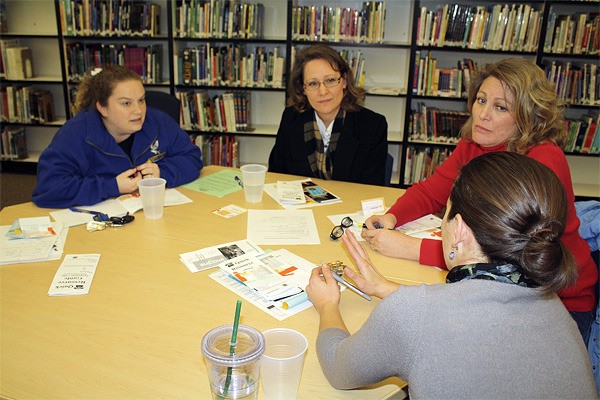Talking about suicide, scary as it is, will not make anyone’s problems worse, says Sue Eastgard, Director of the Youth Suicide Prevention Project. More likely, it will help someone.
“Most suicidal people don’t want to die,” she said. “They are, most of the time, relieved that someone has broached the subject with them.”
The safeTALK training that Eastgard put on at Snoqualmie Middle School on Tuesday, Jan. 26. was designed specifically to start people talking about this very difficult subject. After a three-hour safeTALK training, “unanimously, people feel more comfortable with the subject,” Eastgard said.
A full slate of 30-plus people attended the training, to learn how to tell if someone has suicidal thoughts, and how to help those people. Attendees included school administrative and counseling staff, teachers, and at least one parent, who was gratified to see so many school staff present.
“That’s great that some of the secretarial staff are here, because they see the kids first,” said Bobbi Bland of Snoqualmie, who has a daughter in elementary school.
According to the YSPP website, about 80 percent of people who’ve killed themselves had shown signs that they were considering suicide. In safeTALK, Eastgard categorizes the signs by what the observer sees, hears and otherwise senses. Training helps people “to better understand the ways that suicidal people tell us, both in their behavior and in their words, that they are in trouble,” Eastgard said.
Anger, guilt, depression, alcohol or drug abuse, reckless behavior, and many anti-social and non-verbal behaviors could be signs that a person, of any age, is thinking about hurting himself or herself. The warning signs can also be subtle, so listening is very important, especially for the next step.
If you sense any type of warning sign in someone, Eastgard said, “Then you’re going to ask the direct question that’s so hard to ask… ‘Are you feeling so badly you’re thinking about suicide?’”
Then, be ready to listen to what they say, because “hardly anybody says no to that question,” said Eastgard.
It’s a myth that asking someone directly about suicide will plant the idea, says Kristy Trione, who’s taken the training. “Sue really drives home the fact that they’ve already got the idea in their heads.”
The safeTALK training also covers how to connect a person who needs help with the right resources, and some basic role-playing, to give participants a chance to ask those hard questions. Many of the participants worked at elementary and middle schools, where youth suicide was not as much of a concern, but all were ready to learn.
“My feeling is that you can never know enough about the topic,” said Snoqualmie Middle School counselor Heather Kern.
Adminstrative assistants Karon Paauw and Jean Christensen, also at SMS, wanted to be able to help if they saw a need.
“It would be good to know about what the signs are,” said Paauw.
“And if you could recognize them,” Christensen added.
Last week’s safeTALK and the upcoming two-day Applied Suicide Intervention Skills Training (ASIST) are offered free to Valley residents by the Snoqualmie Valley Community Network, which is sponsoring the training.
Trione, a Community Network facilitator, explained that youth suicide is one of the network’s two main issues, and has been for several years, because of the results of the network’s biannual Healthy Youth Survey.
“In 2005, when we looked at the results, there was a spike in suicide ideation and attempts,” she said. The highest numbers were reported for sophomores in the Snoqualmie district.
Since 2005, the numbers have declined, but they’re still significant enough for the Network to maintain its focus on the issue. Providing training such as safeTALK helps community members prepare for handling a situation with a suicidal person, Trione said, and “to wrestle with the question of what’s going on in our community.”
ASIST is a two-day workshop open to all people who work with youth in a professional capacity. The session is Feb. 7-8 at Chief Kanim Middle School. For more information, visit www.yspp.org or www.snoqualmievalleycommunitynetwork.org.



